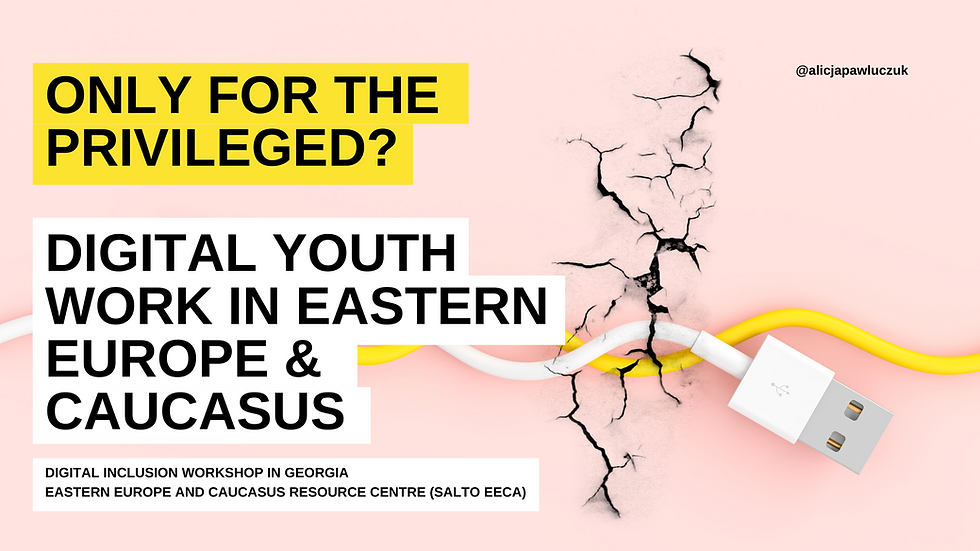Only for the privileged? Digital Youth Work in Eastern Europe & Caucasus (workshop in Georgia)
- Alicja Pawluczuk
- Jan 21, 2022
- 3 min read
Updated: Feb 9, 2022

"Digital Youth Work is only for the privileged"
I heard this sentence when facilitating a workshop for SALTO Eastern Europe and Caucasus Resource Centre in Georgia. My 60-min session covered things like digital inclusion, young people's and youth workers' experience of digital transformation in the youth sector, and the sudden digitalisation of youth services during the pandemic. The purpose of the session was to get to know the SALTO-EECA partners and learn about their experiences of digital transformation in their countries (Armenia | Azerbaijan | Belarus | Georgia | Moldova | Russia | Ukraine).
My workshop materials were colourful. I was full of energy and enthusiasm - super keen to preach my digital inclusion agenda.
I put my European-centric-digital-youth-work-lense, thinking it would help me to contextualise some of the challenges in the SALTO-EECA network. Well, it kind of did, but it also didn't...
the important [yet unattainable] dream of meaningful digital inclusion
When talking about digital youth work and digital inclusion, we often emphasise the word meaningful. It's not just about using tools to communicate with young people but to empower them to co-create their own digital tools. It's about young people's meaningful, proactive, and informed participation in digital transformation
We think big, we dream big - and, why shouldn't we? It is crucial we demand a more inclusive future and society for all (and digital transformation is a huge part of it).
But, what if dreaming big distracts us from noticing some of the most nuanced challenges in digital inclusion?
My SALTO Eastern Europe and Caucasus Resource Centre workshop has helped me to discover my own ignorance/limitations/internalised assumptions (not sure what to call it) when it comes to youth digital inclusion. My [primarily] European experiences of digital youth work has shaped the way I think of digital inclusion challenges - they have become my comfort zone too.
The Eastern Partnership countries and Russia are faced with their diverse challenges. These might be associated with their political, socio-economical, and cultural power structures. Without enclosing any details from the workshop, let me just say that some of the things I advocate for (re. meaningful digital inclusion) might have sounded quite unrealistic, if not patronising.
What if examples of digital youth work or digital inclusion projects do not inspire but actually disempower? How can I unpack some of the big ideas into smaller bits that can be contextualised in different settings (even the most opressive ones). I'll leave these questions open for now.
One of the topis I previously disscussed in my Girls' Digital Inclusion research at the UN University is the importance of intersectionality and responsivness when it come to digital inclusion projects (their design, delivery, and evaluation). In the report I wrote:
The process should involve ongoing analysis of participants' economic, cultural, and digital contexts, including digital access, usage, ownership,behaviours, and barriers.
I obviously did not have the time to do this during my 60-min intro workshop. Youth digital inclusion in the Eastern Partnership countries and Russia are regions that I was not familiar prior to the workshop either - and, the most that I've learnt so far was directly from the participants. Moving forward, I'd like to continue learn more about the region and have the time to trully co-examine the youth sectors' realities in the context of digital trasnformation.
The workshop was an important learning opportunity and a reminder to check in with myself on a regular basis in terms of how I frame my research, thinking, and doing around digital inclusion. In 2022, this might possibly involve less talking and more listening.
I look forward to working with SALTO Eastern Europe and Caucasus Resource Centre later this year to dig deeper into this topic. In the meantime, you're welcome to see the slides I have used during the workshop.



Comments